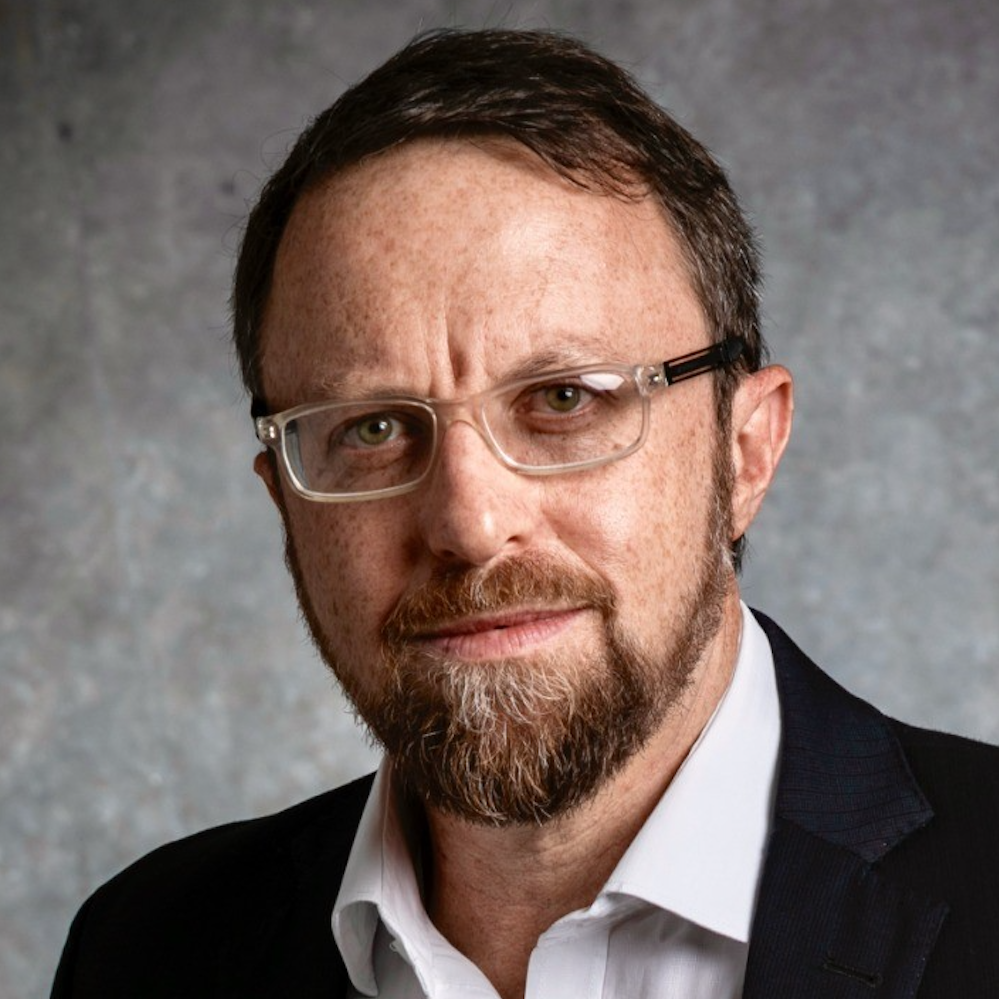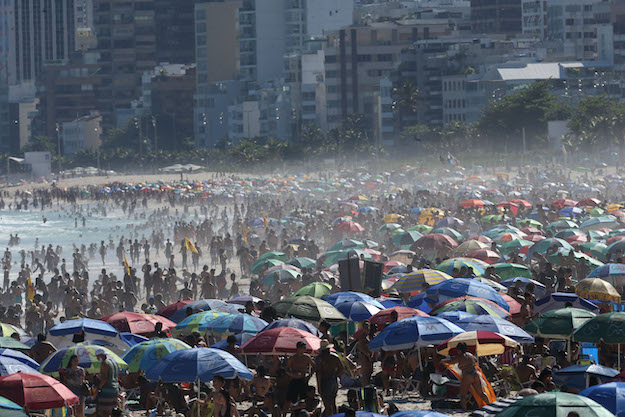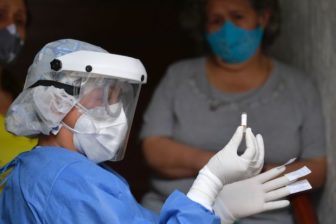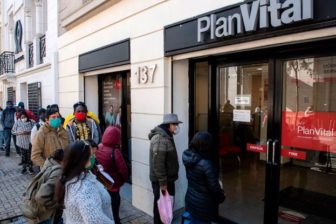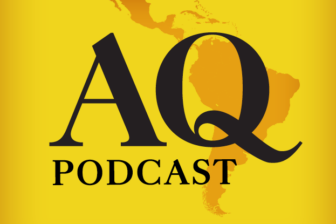RIO DE JANEIRO – It was a perfect Sunday in Rio de Janeiro: sunny and hot, with temperatures above 95 F. On Ipanema Beach, you couldn’t walk straight without bumping into volleyball players, or children building sandcastles. Hardly anyone was wearing a mask, or much of anything at all. It almost felt as if the pandemic was over.
It’s not, of course – far from it. Brazil’s national daily death rate has averaged over 900 people in the past seven days, down only slightly from the more than 1,000 a day average since June. More than 120,000 have perished since the outbreak began, a catastrophe second only to the United States. But elsewhere, too, you see signs that many Brazilians have moved on – psychologically, and in their actions. In bars, family WhatsApp groups and on the radio, discussions have shifted from quarantine habits and hand sanitizers back to soccer matches, which resumed in June. In the Aterro do Flamengo Park, across the street from my apartment, joggers are back to their usual numbers – and in contrast with two months ago, hardly anyone now wears a mask.
Even Jornal Nacional, the venerable nightly newscast seen by some 30 million Brazilians, which covered COVID-19 with great intensity during the initial months of the pandemic, has shifted its focus. On Aug. 4, for the first time in 164 days, the program did not mention the virus among its initial headlines. Since then, much of the coverage has shifted to a possible vaccine – as well as the latest corruption scheme involving Brazilian politicians.
How to explain this shift in the national conversation? And in Brazilians’ everyday behavior?
In two words: Jair Bolsonaro.
The Brazilian president has done a disastrous job with the public health response to the pandemic, making decisions and statements that have cost untold numbers of lives. But he is winning the narrative war, which pits him against scientists, newspapers and opposition leaders, and his approval numbers have strengthened in recent polls to 50%. In recent weeks, governors and mayors who tried to convince the public of the coronavirus’ dangers and order closures and social distancing have largely given up. There are many reasons for Bolsonaro’s victory, but one stands out: He understands the soul and fears of average Brazilians better than perhaps any other politician in 2020.
In March, when the World Health Organization (WHO) decreed COVID-19 a pandemic, Bolsonaro did not hesitate – he rejected from day one the possibility of closing businesses and schools. Notably, Bolsonaro does not have a professional marketing guru like Dilma Rousseff did with João Santana, who showed her polling to guide and reinforce her major decisions (and eventually ended up in jail for corruption). Based on his own intuition, and perhaps that of a few family members and advisers, Bolsonaro understood that the first concern of Brazilians would be their own economic survival. Public health experts have insisted the debate between the economy and quarantines is a false one – that the economy would eventually suffer even without a shutdown. But most Brazilians didn’t see it that way. In a country where half the population lives on less than $180 a month, having a source of income makes the difference between survival and hunger.
Brazil’s president thus made every effort to play down the effects of COVID-19, boycott scientific recommendations and block quarantine initiatives from governors and mayors. On a national TV broadcast Bolsonaro called the coronavirus “a small flu,” compared it to a rainy day (“everyone gets wet sometime”) and recommended that Brazilians should go to the streets and “face the disease like men.”
When governors and mayors decreed quarantines to differing degrees, adhesion was at first relatively strong. Traffic almost disappeared in cities like Rio and São Paulo. But Bolsonaro went out without a face mask to walk and talk with street vendors plying their trade in working-class areas of Brasília. “They just want to work,” he said. At that point he made a connection no other politician has been able to pull off, namely convincing the poor he was looking out for their self-interest; even if the actual reality, from a public health perspective, was the opposite.
A few weeks later, as the virus spread across the country, Bolsonaro fired two health ministers in close succession, as well as doctors who defended quarantines and ruled out the use of drugs such as hydroxychloroquine without clinical evidence of its effectiveness. The president then proceeded to appoint as his next health minister an Army general, whose first measure was to attempt to change the formula for calculating the number of death victims. When the Supreme Court ruled that governors had the authority to decree lockdowns, Bolsonaro attacked the judges at rallies and threatened them with military intervention. Asked by a reporter to talk about the victims, the president, whose middle name is Messias, reacted: “So what do you want me to do? I am Messiah, but I do not perform miracles.” Denying COVID-19 became state policy.
As recently as late June, it appeared that Bolsonaro was under siege. Every night, middle- and upper-class neighborhoods that had strongly supported him during the 2018 election were taken over by the sound of panelaços (pot-banging protests). Things got worse when a former aide was arrested for corruption. At that moment opposition leaders probably could have made a case for impeachment.
What changed? Several things: While among the upper classes Bolsonaro was being mocked for his denialism, something different was happening in the poor neighborhoods of big cities and in the small towns. Pressured by opposition leaders in Congress, the federal government had been forced to create a social program that would give 600 reais, or about $110, to every Brazilian affected by the pandemic. Bolsonaro’s initial intention was to distribute only $35, but once the bill passed into law he cheered the program as if it were of his own making.
It was helicopter money and it worked. Over a four-month period, the Brazilian government distributed over $40 billion to 66 million Brazilians who, without this benefit, would have found themselves in conditions of utter poverty. In the northeast, the poorest region in the country and where Bolsonaro lost in 2018, the average wage actually grew compared to before the pandemic. Bolsonaro, who from the onset of the pandemic spoke about saving jobs instead of lives, was now positioning himself as the champion of the very poorest.
Bolsonaro himself came down with COVID-19 in July and was confined to the presidential residence for treatment. From there he told his followers on Facebook that he was curing himself with hydroxychloroquine, the same medicine rejected by his former health ministers (he was careful not to disclose that he had a team of six doctors by his side 24 hours a day and a helicopter in his garden that could have taken him, if the need arose, to an intensive care facility in less than 5 minutes). In the event, he soon got better and ultimately came away from it all as a living proof of his creed: the coronavirus was only a flu, just as he had said.
If among the poor the social programs served to relieve their fear of extreme poverty, the middle and upper classes were by July simply getting fed up with the pandemic and the limitations it imposed. The first bars that opened up again in July were crowded with people. For these people, and others, it may have been easier to just embrace what Bolsonaro was saying, even if they had resisted at first.
“After five months, many have become tired, feeling the weight of anxiety and depressing conditions caused by financial insecurity, the absence of family members and the lack of conviviality with friends. At this moment, a large part of the Brazilian population has decreed, on its own, the end of the epidemic,” wrote the well-known doctor Drauzio Varella in Folha de S. Paulo newspaper. In earlier months he had been under fierce attack by the bolsonaristas for advocating a rigid lockdown.
A survey by the pollster Datafolha taken two weeks ago showed that 47% of Brazilians consider that the president is not to blame for deaths from the coronavirus. Another 41% say he is one of the culprits, but not the main one, and only 11% think that the president bears the most responsibility. Brazil is still a divided country, but much less so than one would expect looking at the numbers for COVID-19 fatalities.
This is a story still in the making. In December the social voucher will likely end or be drastically cut, and it is impossible to say with any certainty what the popular reaction will be. In mid-year the IMF forecast that Brazil’s GDP would fall by almost 10%, but now the average market prediction is at around negative 5% to 6%. That is better than most countries in South America, but one should take these numbers with a grain of salt. The impact of the federal social programs is so high that some of the recent economic activity is artificial. Also, there is a concern in financial markets that Bolsonaro will spend what it takes to keep his popularity, thus raising serious doubts about Brazilian public accounts for the next few years.
On Aug. 24, Bolsonaro spoke for 15 minutes and 12 seconds at the presidential palace in a ceremony dubbed “Brazil is winning the fight against COVID.” He thanked the doctors who defended his ideas about the usefulness of hydroxychloroquine, criticized opposition governors and did not once mention the 120,000 victims. For now, at least, Bolsonaro’s narrative has won. Not with a bang, but a whimper.
—
Traumann is a journalist and independent consultant. He is the author of O Pior Emprego do Mundo (“The Worst Job in the World”), a book about Brazilian finance ministers.


